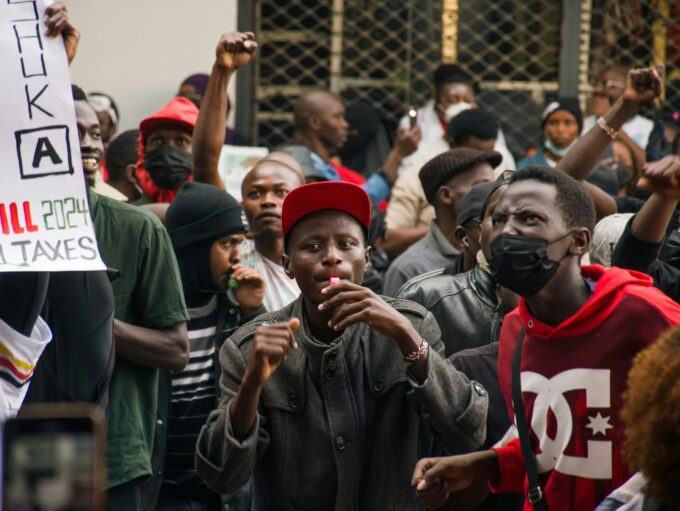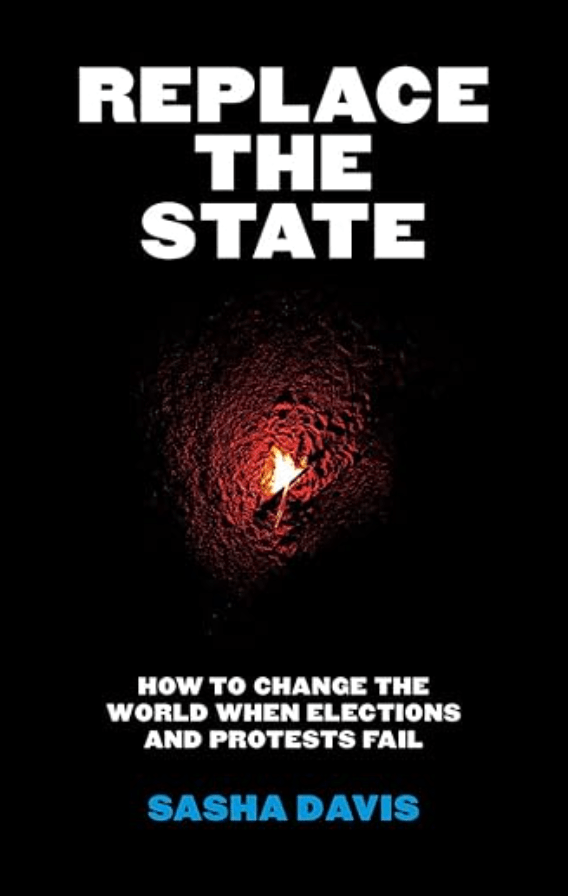
Image by Hassan Kibwana.
My new book is now out. Replace the State: How to Change the World When Elections and Protests Fail is available now direct from the University of Minnesota Press, Bookshop.org, your local bookstore, or anywhere you buy books. The paperback is $20. The book’s official publication date is August 5, but the distributor has it now and folks who pre-ordered already have their hard copies. It’s nice to see it out in the world!
I wrote this book with the hope that it would be useful for confronting the political challenges we’d be facing when it was published. I confess that as I was continually revising this book over the past several years and shopping it around to different publishers, I had a nagging fear that the book would come out ‘too late’ and no longer be relevant to the urgent political tasks confronting us when it was published. I had to tell myself that it was a book worth writing, even if some of the analyses and suggestions didn’t exactly match the moment when it would see the light of day. One thing I can say today for certain, however, is that this I think the book does speak to the current moment – perhaps depressingly so. As I see more people in despair that traditional techniques for social change have been ineffective, I think that this book has come out at exactly the right time.
In the book, I examine different political tactics that folks use in settings where there has never been much hope that elections or protests are going to protect people’s rights or improve their lives. The examples I draw upon come from colonized, occupied, and marginalized communities (inside the U.S. and outside) where people have long had no real political power, voice, or representation within a federal government that rules over them. These are contexts where folks have rarely had any illusions the state cares about them at all. 
There have always been places and people under U.S. sovereign control that have had no ability (or severely restricted ability) to affect policy and governance – think of Puerto Rico, Indigenous lands, people under 18, people without formal citizenship or who have had their voting rights revoked. There are also more informal ways in which all of our political wills have been limited: the disproportionate influence by the rich over legislation due to corporate campaign donations and lobbying, corrupt (or non-existent) primary processes for major political party nominees, gerrymandering, and so on. These restrictions on our political agency have always been there, but today they are expanding even further. In our current situation, techniques for creating social change which may have been somewhat successful at creating minor reforms in the past (like elections and protests), are becoming less and less effective as oligarchical control tightens and authoritarian practices override former democratic norms.
Put simply, more and more of us find ourselves in the place where we have no practical access through the ‘formal channels’ to meaningfully influence the governance we live under. The U.S. government increasingly follows the dictates of a very small class of the wealthy and connected whose values and priorities are completely out of whack with the rest of us. Simultaneously, the government structure is becoming almost impervious to calls by the majority to run the country in ways that actually benefit most of the people living in it. This has gotten worse under Trump, but the pattern long predates him. This book is therefore not an argument in favor of one political party or another. It is instead a deeper critique of long running political processes we need to transform.
What is the value of this book in the current political moment?
When I was finishing the writing for this book, I wasn’t sure who would win the November 2024 election. I did however know one thing: people were likely to be dissatisfied with the result. I think it was predictable that after the election, regardless of the outcome, the U.S. government would turn a deaf ear to people advocating for more meaningful change. Now that we are being smacked in the face by the dangerous police state shitshow that is U.S. politics in 2025, it should be clear to everyone we need to think about different ways to create genuine and effective political influence so we can protect ourselves, our communities, and the environments on which we depend.
The government may be getting completely out of the business of protecting human well-being (by shredding the social safety net, decimating public education, slashing health care access and research, transferring more wealth to the ultra-rich, and supercharging its apparatuses of police surveillance and repression), but let’s face it, the state was only tangentially interested in human well-being before this year. The primary functions of this government have long been to facilitate the ability of capitalist firms to accumulate profits and to protect the unequal property relations of the class of people who set it up (i.e. not you).
While the state may be against most of us, this book emphasizes that is no reason to fall into political paralysis or despair. After all, the state has rarely cared much about human security. Thankfully the state is absolutely not the only institution or scale where we can exert political will and enact different ways of governing ourselves. People enact positive social practices outside the state all the time, and, in this age, we need to do it even more. This book discusses how we can do this – and why we should.
I created this book to be a resource that could shed light not just on histories of political repression, but on the stories of successful and innovative projects aimed at transforming our political relationships with each other and the environments which sustain us. More importantly, I wanted this book to be a resource that could help start conversations about how we can assert our own power and make life better now – whether the government wants us to or not.
I want people to see past the mistaken assumption that the state is the only place where politics happen. We can do things in our communities now that not only model what could be, but which create the structures and practices that can bring change at grander scales. In short, we can develop alternatives that supplant the horrors of the governance being practiced by the existing state.
Now that the book is out, I plan to turn more to local organizing in my own community and to doing talks, interviews, and meetings wherever folks are interested in learning more about these approaches to activism and political transformation. I think these approaches are going to be crucial in the months and years to come as we all try to fight for a different future than the very dark one the government wants for us. Hope to see you out there.
The post Replace the State! appeared first on CounterPunch.org.
This post was originally published on CounterPunch.org.